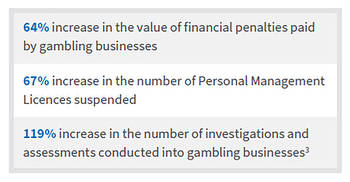Recap Of UK Gambling Regulations For 2021

As the home of one of the world’s largest gambling markets, the UK enforces tough regulatory measures to hamper addiction and gambling-related harm. Adequate regulations are now more necessary than ever, considering the industry has witnessed an increase in online gambling in the past couple of years due to the coronavirus pandemic.
The British regulatory watchdog, the UK Gambling Commission (UKGC), released data that indicates the activity and gross gaming yield (GGY) of gambling sites have significantly increased during the first few months of 2021. The number of active accounts in April grew by 4%, while the GGY rose by 3% during this period.
Against the backdrop of these figures, the UKGC called for greater vigilance on operators’ behalf and introduced stricter requirements that aim to ensure higher levels of player protection. Although pandemic-associated restrictions have started to ease down in the country, UK-licensed gambling companies still must adhere to the new requirements summarized in this article.
New Requirements for Online Slots
UKGC has established the number of slot playing sessions with a duration of over an hour stood at 2.6 million for the above-mentioned period. In the meantime, slots accounted for £202 million of the operators’ gross gambling yield from March to April. It is, therefore, unsurprising that some of the watchdog’s new regulations concern online slot play.
To begin with, the UKGC imposed a permanent ban on slot features that increase the pace of play. One of the most prominent examples is the turbo mode, which greatly decreases the amount of time in between bets.
The new package of changes also includes a prohibition of the autoplay functionality which, according to the Commission, can cause reel spinners to lose track of their play. In turn, this may make it difficult for some people to cease betting or allow them to play other gambling games concurrently.
The ban additionally extends to features that create a false sense of control over the spins’ results. Losses disguised as wins (LDWs) also came under fire. To give you some context, this phenomenon frequently occurs in multi-payline slots. The player registers a small win on one or more lines but the payout is either equal to or lower than their overall stake.
The “win” is frequently accompanied by loud sounds and flashy animations that distract the player from what is an actual loss. According to UKGC data, slots boast the highest monthly spend per player, or £67. By contrast, British gamblers spend approximately £45 per month on sports betting and £36 per month on other casino products. To offset this, the regulatory body has enforced a 2.5 seconds timeframe between spins.
No Reverse Withdrawals for British Online Gamblers
The UKGC now requires licensed operators to prominently display the overall profits and losses each player has generated. The duration of the betting session should be visible at all times as well. Alongside these changes, the regulator has permanently prohibited reverse withdrawals on online gambling sites.
For the uninitiated, this function enabled players to cancel pending withdrawals, re-gamble their money, and potentially lose whatever they have won. According to the UKGC, reverse withdrawals boost the risk of harm to gamblers, causing them to give in to the temptation to continue playing.
From now on, all UKGC licensees will have to adopt manual flushing where the funds requested for a withdrawal remain “locked” in players’ accounts until the operator approves the payment. UK-licensed online operators have until October 31, 2021 to implement the new player-protection measures.
Some aspects of the UK regulation underwent changes in the last couple of years and the amendments are all part of the regulator’s plans to render gambling safer and fairer. As part of this initiative, the Commission strengthened the age and identity verification procedures at online gambling sites. Remote operators must now obtain proof customers are of legal age before they gain access to any gambling products.
Respectively, unverified players cannot engage in casino games in demo format with free credits. The Commission additionally prohibited the use of credit cards for gambling purposes. The credit card ban extends to both landbased and online betting operations.
VIP Schemes May Be Banned Permanently
The regulator also took a jab at VIP schemes, introducing a new set of guidelines for gambling companies to follow. The senior administrators of the betting sites must now manually approve VIP membership for all customers under the age of 25. On top of that, the members’ accounts must undergo enhanced monitoring to identify signs of potential gambling harm.
Further measures are looming over the UK gambling industry as the 2005 Gambling Act that regulates it is currently undergoing a review. Operators stand a good chance of altogether parting with VIP schemes as some government ministers have insisted on an outright ban on these incentives.







































